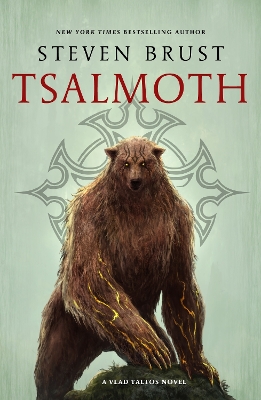Reviewed by Metaphorosis Reviews on
Summary
Vlad and Cawti are working through the planning for their wedding ceremony. But, wouldn't you know it, a dead debtor turns out to be part of a far more complicated plot than it first appears.
Review
If there were ever a book that screamed, “low effort”, this is it. Having just read two of its prequels recently, in the early quarter or so of Tsalmoth I honestly wondered whether this was a) a bad early draft, b) ghost written, or c) a backup or trunk story that Brust dug out because he was out of ideas. The story gets somewhat better after that, but it still feels very much like an author taking his audience for granted and just going through the motions.
For one thing (supporting option c above), virtually all of the story takes place well in Vlad’s past – his wedding with Cawti, pre-Rocza – with just a stub of framing at the end to tie it to the present. There’s nothing at all about the big mystery that was (laboriously) hinted at in Vallista. Book 17, which I assume will be the last (and will be the last I buy) had better be a blockbuster.
In this book, Vlad finally loses his charm. He’s just downright mean sometimes, and not in a cute way. That’s particularly notable, because he and Cawti spend so much time fawning over each other. The humor is still there, but frankly a lot of it is pretty tired – it’s the same jokes we’ve seen in the 15 prior books, but sometimes with less subtlety.
The plot is, as so often with recent Vlad novels, well, let’s say ‘hard to follow’, because ‘nonsensical’ sounds mean. It’s basically an excuse to get Vlad in trouble, make snarky remarks, and have him contact his powerful friends to help him out. The one really interesting element (a change in Vlad that I thought would tie in to the book 17 resolution), goes away without ever having much impact.
If you’re this far into the series, you’re likely to get this book too, and the next one. I will, despite this disappointment. But know that if you decide to skip this one, you’re not missing much. It feels strongly like filler that finally found a slot.
I received this book for free in exchange for an honest review.
Merged review:
2.5 stars, Metaphorosis reviews
Summary
Vlad and Cawti are working through the planning for their wedding ceremony. But, wouldn't you know it, a dead debtor turns out to be part of a far more complicated plot than it first appears.
Review
If there were ever a book that screamed, “low effort”, this is it. Having just read two of its prequels recently, in the early quarter or so of Tsalmoth I honestly wondered whether this was a) a bad early draft, b) ghost written, or c) a backup or trunk story that Brust dug out because he was out of ideas. The story gets somewhat better after that, but it still feels very much like an author taking his audience for granted and just going through the motions.
For one thing (supporting option c above), virtually all of the story takes place well in Vlad’s past – his wedding with Cawti, pre-Rocza – with just a stub of framing at the end to tie it to the present. There’s nothing at all about the big mystery that was (laboriously) hinted at in Vallista. Book 17, which I assume will be the last (and will be the last I buy) had better be a blockbuster.
In this book, Vlad finally loses his charm. He’s just downright mean sometimes, and not in a cute way. That’s particularly notable, because he and Cawti spend so much time fawning over each other. The humor is still there, but frankly a lot of it is pretty tired – it’s the same jokes we’ve seen in the 15 prior books, but sometimes with less subtlety.
The plot is, as so often with recent Vlad novels, well, let’s say ‘hard to follow’, because ‘nonsensical’ sounds mean. It’s basically an excuse to get Vlad in trouble, make snarky remarks, and have him contact his powerful friends to help him out. The one really interesting element (a change in Vlad that I thought would tie in to the book 17 resolution), goes away without ever having much impact.
If you’re this far into the series, you’re likely to get this book too, and the next one. I will, despite this disappointment. But know that if you decide to skip this one, you’re not missing much. It feels strongly like filler that finally found a slot.
I received this book for free in exchange for an honest review.
Reading updates
- Started reading
- 2 April, 2023: Finished reading
- 2 April, 2023: Reviewed
- Started reading
- Finished reading
- 2 April, 2023: Reviewed
